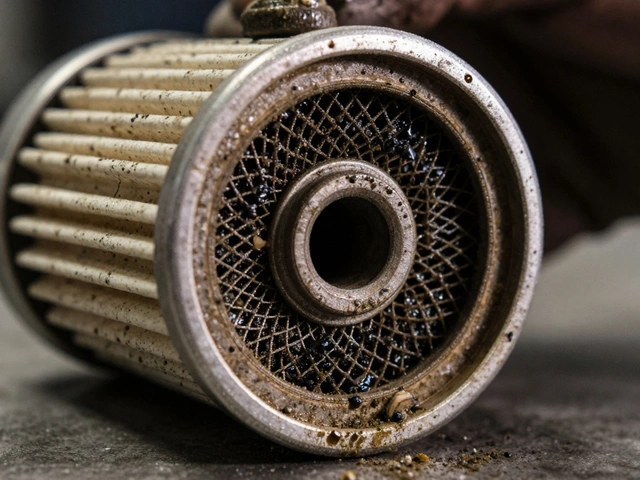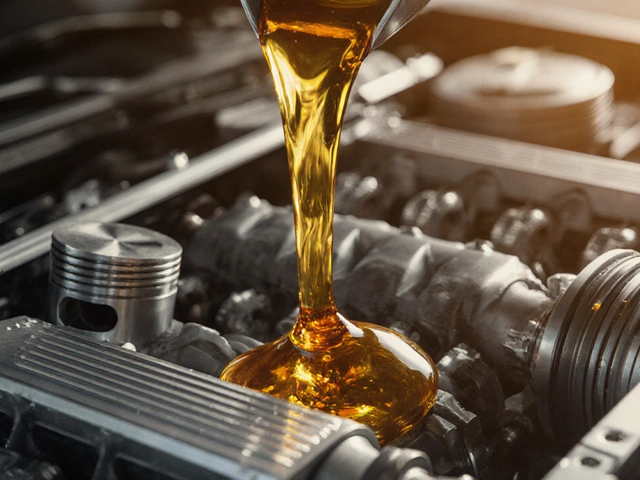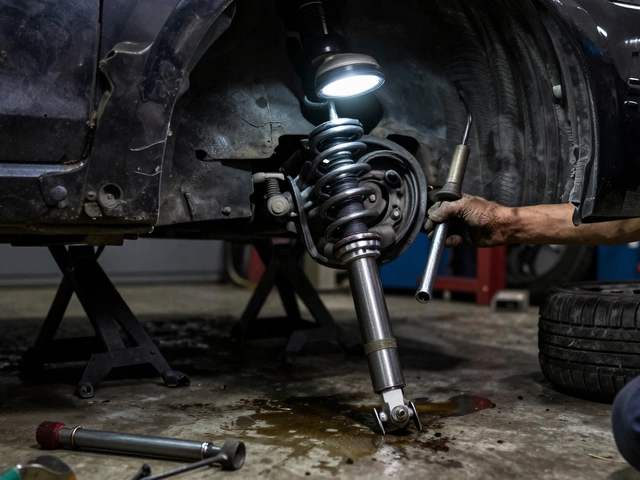Got your oil level on your mind? Good thinking. Engine oil is like the lifeline of your car, keeping everything running smoothly. You're making a smart move by wanting to know exactly when to top it up.
First off, every car's a bit different. You might think, "Can't I just wait for the oil change light?" Sure, but there are a few key things to consider before you postpone. For instance, newer cars usually have top-notch sensors that will alert you. But older models, or if you're stuck in traffic for hours, might need a little more TLC.
So, asking yourself 'How often?' can depend on your unique situation. Weather, driving conditions, and even how you generally treat your car play roles too. Stay tuned as we break down the nitty-gritty of keeping your engine happy and avoid any sneaky problems down the road.
- Why Engine Oil Matters
- Factors Influencing Oil Top-Up Frequency
- Signs Your Car Needs an Oil Top-Up
- Pro Tips for Effective Oil Maintenance
Why Engine Oil Matters
So why is engine oil such a big deal, anyway? Imagine running a race barefoot on scorching asphalt - not pleasant, right? That's essentially what your car's engine would feel without oil. The primary job of engine oil is like a best buddy that ensures all those metal parts inside your engine don't grind each other to bits.
Lubrication: Keeping Things Smooth
Your engine is made up of tons of moving parts. Without the slick presence of oil, things would seize, and you'd be in for some nasty repairs. The oil coats everything, reducing friction and helping parts move easily. This keeps wear and tear at bay, extending the life of your engine.
Heat Management: Playing It Cool
Besides just being slippery, engine oil also helps manage heat. Engines get hot—really hot! Oil absorbs some of that heat and redistributes it, preventing overheating and keeping everything running at the right temperature.
Cleaning: The Inner Housekeeper
As your engine runs, little deposits and dirt start to collect. Over time, they can cause major problems. This is where engine oil plays a surprising role as a cleaner. The oil's detergent agents help capture and move these deposits to the oil filter for removal.
Sealing: Bridging the Gaps
Finally, oil helps create a seal between engine parts, like pistons and cylinder walls. This tightens things up, meaning less blow-by (or when fuel and air escape past the piston rings) and more power from combustion.
Protecting Against Corrosion
The engine itself is prone to rust and corrosion, particularly when exposed to moisture. Oil adds a protective layer, warding off these damaging elements. This added layer of security can mean the difference between an engine that purrs and one that sputters.
Just remember: always use the right type of engine oil for your car. This isn’t just about preference; wrong oil can mean trouble, like engine knocking or reduced efficiency. So, keep your car running happy and healthy with regular top-ups!
Factors Influencing Oil Top-Up Frequency
Wondering how often you should top up your engine oil? It's not one-size-fits-all. Let's break down the factors that play a major role in your oil schedule.
Driving Conditions
You're probably already aware, but how you drive can seriously impact your oil needs. If you're the type who's stuck in city gridlocks or enjoying long road trips, know this: city stop-and-go traffic might mean you'll need top-ups more frequently. Conversely, highway driving is usually easier on your engine oil.
Engine Age
Got an older car? Keep an eye on your oil levels. Aging engines can consume more oil, so regular checkups can prevent you from getting stuck in a jam. A quick peek at your dipstick between regular changes can go a long way.
Oil Quality and Type
The kind of oil you choose matters. Synthetic oils are popular for their longer-lasting performance. While they tend to be a bit pricier, they might reduce your overall oil top-up frequency. But it’s always a good idea to stick with what your car's manual recommends.
Weather and Environment
Believe it or not, Mother Nature plays a role too. Extreme cold or heat can take a toll on your car’s oil. In colder climates, your engine might require less frequent top-ups due to thicker oil. Conversely, hot and humid areas might demand closer monitoring.
Driving Habits
Are you a pedal-to-the-metal kind of driver? Vigorous driving can lead to quicker oil degradation. So, if you love speedy take-offs or frequent hard braking, consider keeping some oil handy for more frequent top-ups.
Understanding these factors ensures that your car maintenance routine doesn't hit bumps in the road, keeping your vehicle in top-notch condition.

Signs Your Car Needs an Oil Top-Up
Wondering if your beloved ride needs a dash of engine oil love? Let's get into the tell-tale signs that your car's craving an oil top-up.
1. That Pesky Oil Light
If the oil warning light on your dashboard switches on, it's not to be ignored. This usually points to a drop in your engine oil levels, and it’s screaming for attention. As an experienced mechanic once said,
"An oil warning light is not like a birthday reminder—it's more like a fire alarm."
2. Strange Engine Noises
Notice a slight knocking or ticking sound coming from under the hood? It might be your car's way of hinting that the engine oil level is dipping too low. These sounds are more noticeable when starting the car and should get you to check the oil level pronto.
3. Visual Oil Level Check
Perform a quick and simple dipstick check. Pull it out, wipe it, dip it back and see where the oil line hits. Pretty handy, right? If it shows a low level, there’s your answer.
4. Unusual Smoke from Exhaust
If your exhaust pipe suddenly starts resembling a smokestack, especially bluish smoke, it may indicate burning oil. This isn't something to brush off easily and needs your attention.
5. Poor Engine Performance
Feel like the car's sluggish or just not as peppy as usual? A lack of engine oil could be reducing efficiency. Regular top-ups can keep things humming along nicely.
| Sign | Importance |
|---|---|
| Oil Light On | Immediate Action Required |
| Ticking Noises | Monitor & Address Soon |
| Low Dipstick Level | Address Immediately |
| Excess Exhaust Smoke | Immediate Action Needed |
| Performance Issues | Check Oil Level |
Keep these indicators in mind to prevent small issues from turning into major headaches. Your engine will thank you down the road!
Pro Tips for Effective Oil Maintenance
Keeping your car's engine in good shape doesn't need to be rocket science. But a few easy tips could make all the difference in how your car performs. Let's break it down.
Check Your Engine Oil Level Regularly
Engine oil checks aren't just for the pros. Have a go yourself! Once a month or before long road trips, pop the hood and do a quick dipstick read. Make sure the oil is between the two marks. If it's low, top it up with the recommended oil type.
Stick to Your Oil Change Schedule
Follow your car's manual. Generally, change every 3,000-5,000 miles, but some modern cars can go up to 10,000 miles without a worry. If you often drive in stop-and-go traffic or on dusty roads, it's best to be a bit more frequent.
Choose the Right Oil
Not all oils are created equal. Your car's manual will tell you what type to use. Synthetic oils might cost more upfront, but they're great for high-performance cars and colder climates due to better viscosity.
Don't Ignore Warning Lights
If that pesky oil light pops on, don’t just ignore it and hope for the best. It could mean you're running low or there's a more serious problem. Deal with it ASAP.
Watch for Oil Leaks
Have you noticed dark spots where you park? Could be a leak. An oil leak might be anything from a loose cap to something needing professional attention. Don't leave it; get it checked.
Additional Facts and Stats
Did you know proper vehicle care can extend engine life by up to 50%? According to a recent survey, cars that undergo regular maintenance are 40% less likely to need major repairs. Putting in that bit of effort now can save you a ton of hassle and expense down the line.
With these pro tips, you'll keep your engine oil where it should be—working hard so you don't have to worry.






